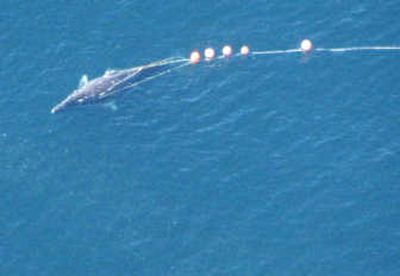Tribe may charge whale’s killers

NEAH BAY, Wash. – The five Makah tribal members who face federal charges for killing a protected gray whale may also face tribal charges.
Makah spokesman Micah McCarty said tribal leaders told federal prosecutors about the pending Makah charges earlier this week in hopes the federal government would defer prosecution to the tribe. That didn’t happen.
“It was our position that we didn’t want to see this paraded in federal court, and if there was a decision made, we were concerned about how it would proceed,” McCarty said. “The real human victims here are the Makah tribe and its people, who now face a more uncomfortable spotlight.”
On Thursday, the five Makah members were charged by a federal grand jury with misdemeanor counts for killing the whale during a rogue hunt last month. The indictment charged the men with conspiracy, unlawful taking of a marine mammal and unauthorized whaling, each punishable by a maximum year in jail and $100,000 fine.
According to the indictment, the five took two motorboats into the Strait of Juan de Fuca off the tribe’s reservation at the tip of Washington’s Olympic Peninsula on the morning of Sept. 8 and harpooned the whale. They then shot it at least 16 times with at least one of the three high-powered rifles they had obtained from the tribe, it said.
The men did not have the tribe’s permission for the hunt, nor did they have a federal permit to kill the whale, which eventually sank in the strait.
The killing was a public relations disaster for the tribe, which had been working with federal authorities to obtain a permit for a legal hunt, and Makah officials rushed to Washington, D.C., to assure the government they did not approve.
“I think … there probably was a lot of political pressure” to file the federal charges, McCarty said Thursday. “It seems a high-profile indictment, and it would be hard for it to go unnoticed.”
U.S. Attorney Jeff Sullivan said the case needed to be prosecuted federally, despite the tribe’s wishes.
“We welcome the Makah tribe’s statements that they plan to prosecute in Tribal Court as well,” Sullivan said in a statement. “However, those proceedings simply cannot replace federal prosecution of this killing, that is clearly illegal under federal law.”
The Makah tribal prosecutor will not file charges against the five until she has access to physical evidence currently in the possession of federal prosecutors, McCarty said. The five could face tribal charges of reckless endangerment and violating the tribe’s Marine Mammal Whaling Plan, as well as three tribal charges of violating federal and state laws – the Marine Mammal Protection Act, the federal Whaling Convention and the state’s fish and wildlife enforcement code.
The Makah Criminal Code states it is a violation of tribal law to violate federal or state laws and sets a maximum penalty of six months in jail and a $500 fine.
The Makah, who have been whalers for centuries, have sought to resume the hunts as part of their cultural heritage. But their treaty rights to hunt whales have been tangled in the courts for several years.
The federal government removed the gray whale from the endangered species list in 1994. Five years later, with a permit from the National Marine Fisheries Service, Makah tribal members killed their first whale in more than 70 years.
Animal welfare activists sued, leading to a court order that the tribe must obtain a waiver under the Marine Mammal Protection Act to continue hunting whales.